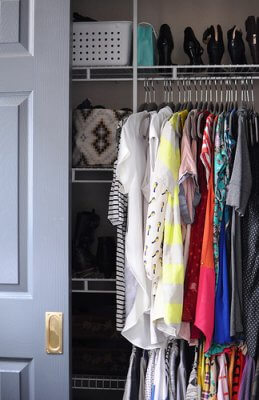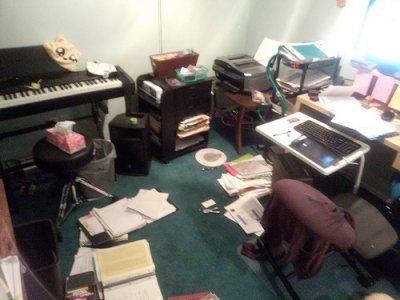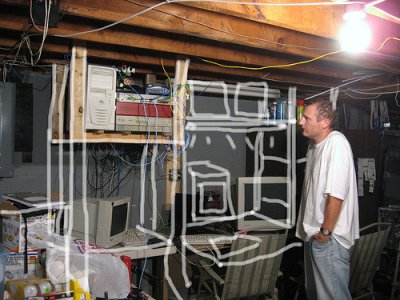Declutter Your Life, Feel Better? The Psychology of ‘Tidying’

By: Emily May
by Andrea M. Darcy
It seems like everyone, their mother, and their pet dog has ‘Kondo’ed’ their lives lately, claiming tidying has made them happier. But is it true? If you declutter your life, will you feel better?
The psychology of decluttering
Let’s look at how a living space and life declutter might lead to better wellbeing for you and those around you — and when it might backfire.
[Life such a mess you can hardly get through your day, let alone declutter? Isn’t it time to get the support you need? Book an online counsellor and get talking.]
1. The Gratitude Boost.
Gratitude itself was once the trend, and became the subject of extensive research.
The results were impressive, showing that gratitude not only improved moods, but led to better sleep, more energy, a greater desire to exercise and less trips to the doctor (read our article for more, “How Practicing Gratitude Changes Your Moods‘).
The popular ‘Konmari method’ of tidying might be better than just a general declutter because creator Marie Kondo places a focus on ‘thanking’ each item you give away for the value it bought to your life. She even encourages ‘thanking your house’ and ‘being grateful to your clothes as you fold them’. Such methods have been made fun of by detractors, but are all ways of showing gratitude.
Konmari method or no, decluttering allows us to more easily see and access what we actually have, meaning we can be more grateful than if we have no idea what is stuffed at the back of closets or sheds.
2. Declutter your life, dopamine high?
Dopamine, one of the ‘feel good’ chemicals in the brain, was previously misunderstood to be just a ‘pleasure hit’. But then research showed it’s not released in response to something good, but when we merely anticipate something important is about to happen. Dopamine is actually a motivation chemical, with the side benefit of a mood lift.

By: Rhona-Mae Arca
How does this relate to decluttering? Dopamine is released if we think we are about to achieve a goal.
New ways of decluttering have become about ‘systems’, decluttering in clearly marked stages. Each stage is another goal achieved, which in itself is shown to raise our sense of wellbeing.
But it also means you create a ‘feedback system’ of dopamine, where you feel better and also more motivated to keep going.
3. Better efficiency?
A small study at the University of Navarra in Spain showed ‘conscientious’ people did better in tidy environments than messy ones. But the study didn’t account enough for variables, and it might be that less conscientious people can excel just fine in mess!
4. Raised self-esteem.
Do you believe you are ‘a mess’, that you never change, and are hopeless at organisation?
This is negative self-talk, and shows how mess and disorganisation can become a tool for self-criticism. We place ‘get organised’ on our yearly list of resolutions, it doesn’t get done, and we beat ourselves up again.
Cognitive behavioural therapy (CBT) believes that sometimes a faster way to a mental breakthrough is to use enforced action, called a ‘behavioural intervention‘.
So one could argue that perhaps asking some friends for support and pushing yourself to do a big life declutter once and for all could be a way to break through long-held negative core beliefs about yourself.
5. Facing up to repressed feelings and experiences.
Objects have stories. And sometimes those stories are things we’ve tried to forget or not process.
An example is clothing of a loved one that has passed on. Giving away the clothing, even years after the original bereavement, can release a final wave of grief you’ve been avoiding, and help you fully process the experience. Not necessarily ‘fun’, but certainly valuable for your mental health.
6. Improved relationships.
Unless you live alone*, clutter is a shared experience. Each person will have their own feelings about living with a surplus of things, and it can cause tension in your family or partnership.
Of course the way we approach a declutter becomes important here. It is not a good idea to throw out someone else’s things without their approval. It’s deceitful and bound to cause conflict.
Deciding to do a big life declutter together, on the other hand, can become an occasion to connect and communicate.
*Note that if you are living by yourself, it’s worth noticing if your declutter is a way to avoid intimacy. Do you tell yourself you can’t have friends over because of mess? What would it feel like to remove that block?
7. Space for new goals.

By: Qfamily
A common life coaching question is, “What are you willing to give up in order to have this new thing you want in your life?’’ We have limited time, energy, and space in our lives. The idea is that by deciding on the ‘payment’ we more easily get to our goal.
Decluttering is like backwards life coaching – you give stuff up first, then suddenly have space and more time for a new goal. Your ‘spillover room’ can now turn into a yoga space, or you newly empty garage an office to start a small business.
When ‘declutter your life’ goes wrong
Like any good thing, tidying can backfire and make us feel worse instead of better. How does this happen?
We’ve already discussed that it’s not a good idea to declutter on someone else’s behalf. This can cause rifts in your relationship. It can also be quite upsetting for a child it a parent throws out something they love, so do include children in the process.
It’s also not a good idea to get rid of things to impress others. Codependency and decluttering are not a good mix. If something makes you feel great, then hold onto it, even if your new partner or friends don’t approve.
Decluttering can also backfire if you are using it as a distraction technique. If you are hoping it will help you stop noticing your marriage is on the rocks, or if you are using it to distract from the pressing financial need to find new employment? It might end up causing you more instead of less stress.
It’s also not the best idea to declutter if you simply are not ready for it. If your kids have recently left home and you are still in the throes of empty nest syndrome, asking them to come by and empty their bedrooms with you might need to wait.
Take that tidying slowly
And finally, be vary wary of biting off more than you chew when it comes to decluttering. Yes, achieving goals is a way to feel good. But making a goal that is too big and does not follow “SMART” goal guidelines is a direct route to feeling like a failure and a great way to self-sabotage. So be realistic with the time it will take and get help if you need it.
Time to declutter not just your house, but your relationships and your mind? Harley Therapy connects you to top London counselling psychologists who can help. Not in London? Use our booking site to find UK-wide registered therapists and online therapists you can talk to from anywhere.
 Andrea M. Darcy is a mental health and wellbeing expert and personal development teacher. She found she over de-cluttered using the Kondo method and found herself looking for things she threw out! Find her on Instagram @am_darcy
Andrea M. Darcy is a mental health and wellbeing expert and personal development teacher. She found she over de-cluttered using the Kondo method and found herself looking for things she threw out! Find her on Instagram @am_darcy




